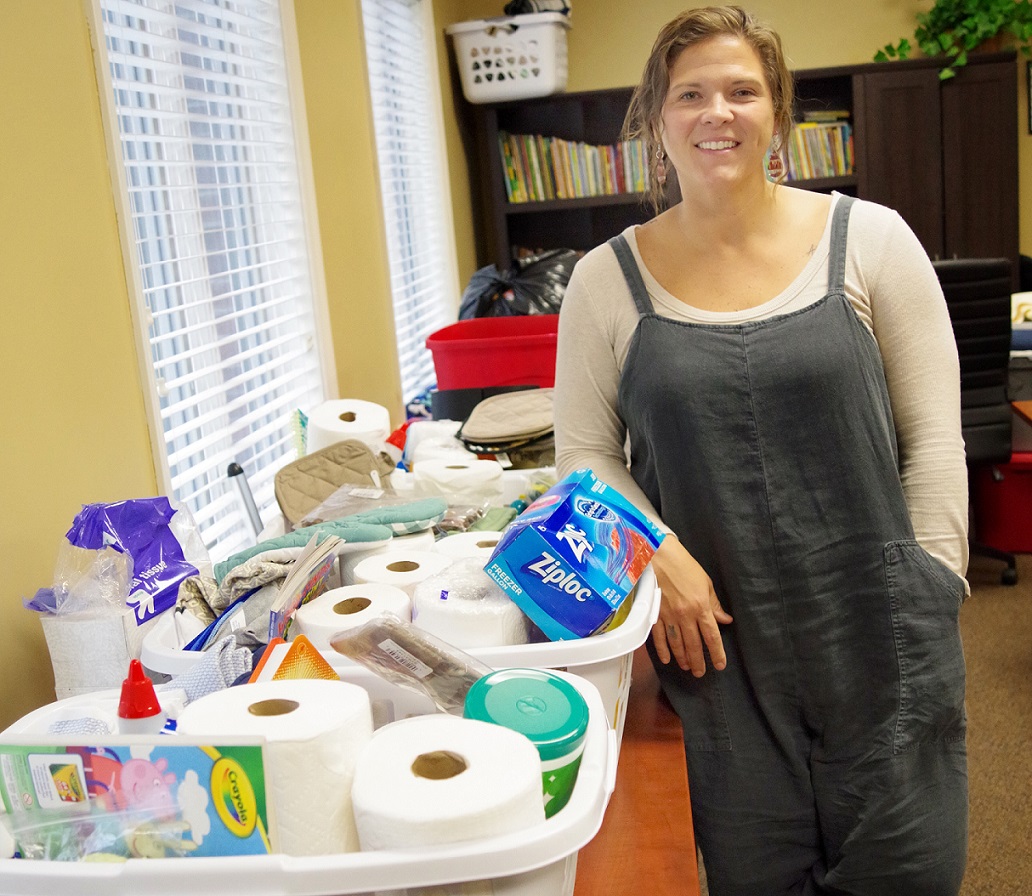Nov. 7, 2024
BY JOHN BAILEY
Of the more than 300 families with children who are homeless in North Carolina, 22 of them are in Catawba County. This is according to the 2023 NC Balance of State Continuum of Care Point in Time count in 79 of the state’s counties.
Whether these numbers seem off in either direction, no one wants to think about what it means for every parent and child on this list.
“As a mom, I can’t imagine how hard it has to be, to be stressed out about where you’re going to put your kids at night, especially if it’s not a safe situation or comfortable situation, cars, couches, floors. I can’t imagine,” Family Care Center Executive Director Rachel Heck said.
Every year, the Catawba County United Way (CCUW) partners with other local non-profits to address the issue of homelessness. The Family Care Center became part of this conversation with the CCUW as a recipient of a Small Businesses Love Big (SBLB) grant.
Impact on Homelessness
Family Care Center of Catawba Valley serves homeless families with dependent children through an emergency and residential program, according to the agency’s website. The agency offers physical, emotional, social and educational services to assist families in the transition to becoming self-sufficient.

“We have some moms who come in with infants, some with toddlers and pregnant. We have single dads. We’ve had multi-generational families where it’s a mom, grandma and grandson,” Heck said.
“And we don’t discriminate based on what lead someone to homelessness. If it was poor financial decisions, if it was underemployment, unemployment, domestic violence, drug use, we’re not going to turn anyone away for any reason.”
Most families the agency helps come from referrals from other non-profits: the Women’s Resource Center, Safe Harbor, Greater Hickory Cooperative Christian Ministries, Ashure Ministries.
And there are expectations of the families entering the program at the Family Care Center.
“Those who shelter hop aren’t as successful as those who are coming to us from other agencies, and that’s because we do have a set of program rules and guidelines,” Heck said.
For the emergency shelter program, guests can apply only one time to enter the program, which allows them to live rent and utility free for up to three or four months.
Guests are subject to weekly home inspections. They meet with a family social worker on a weekly basis to discuss finances, employment and the search for housing, according to the Family Care Center website. Families are encouraged to save $75 - $100 to help when they move into permanent housing.
In the transitional housing program, guests pay a monthly program fee which includes utilities and are encouraged to continue to add to their savings. Guests can stay in this program for up to 12 months and must be a current or past guest that has successfully completed the emergency shelter program.
Since 1988, 90 percent of Family Care Center’s guests who completed the programs moved forward into permanent housing. A key to success in the program is learning how to identify and focus on meeting needs versus chasing wants.
“It’s a huge opportunity for anyone. To go three or four months without having to pay rent or utilities. If you’re working you can stack that money in your savings or pay off past debts, so we hold them accountable while they are here,” Heck said.
Challenges
Like other programs focused on housing, space is an ongoing issue for Family Care Center. The agency has started planning on expansion at its current site in Hickory to meet the growing need. Annually, the agency serves 67 families, including 122 children according to its SBLB application.
The expansion plan would add 20 more homes, but construction can’t start soon enough.
“There was one man. He showed up in a U-Haul with his wife and his two young daughters, and he knocked on the door and said he heard we could house his family, adding they had no where else to go,” Heck said.
“We didn’t have any space and that’s not how our program works anyway. You can’t just show up and expect to stay, but he was desperate. My heart broke for him. You could tell he was at his wits end, trying to find out what to do for his family.”
The agency is hoping it’s expansion program will help address this kind of issue in the future. They’ve raised more than $750,000, half of what they need. Staff hope to serve up to 24 additional families annually.
“No one wants to see a mom sleeping in her car with a baby. No one wants to see a dad walking down the street holding his three-year-olds hand not sure of where they’re going,” Heck said. “That’s what we’re here for, to help them and love them.”
Photo: Family Care Center Executive Director Rachel Heck stands with baskets filled with household supplies families receive when they transition into housing.
